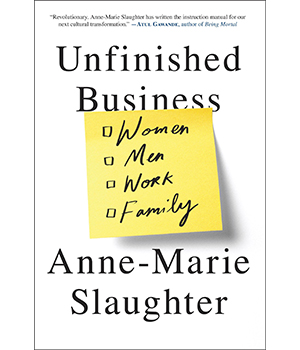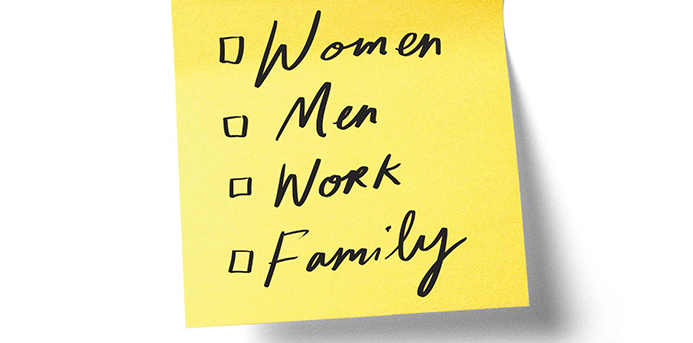My son has a tough choice: ride along to his sister’s volleyball practice or attend an evening Family Action Network event with me. The speaker, Anne-Marie Slaughter, president and CEO of the New America Foundation, former professor and dean at Princeton, will discuss topics from her recent book “Unfinished Business: Women Men Work Family.” What’s an 11-year-old to do? When weighed against a car full of loud little girls, Slaughter wins.
 Slaughter opens by sharing that her view of the thorny issue that is “work-life balance” is as evolving as the issue itself. Her childhood featured a father who encouraged her to have a career while her own mother stayed home with children before beginning her own work as an artist. We are all surrounded by mixed messages like these when it comes to creating space for work and family.
Slaughter opens by sharing that her view of the thorny issue that is “work-life balance” is as evolving as the issue itself. Her childhood featured a father who encouraged her to have a career while her own mother stayed home with children before beginning her own work as an artist. We are all surrounded by mixed messages like these when it comes to creating space for work and family.
It’s a Women’s Issue
Feminism, the passage of equal rights acts and increased access to higher education have made the workplace more open to women, yet Slaughter penned a popular 2012 article titled “Why Women Still Can’t Have it All.” In it, she cites research findings that “women are less happy today than their predecessors were in 1972, both in absolute terms and relative to men.”
In trying to understand the reasons women are so unhappy, Slaughter admits she has written off the reproach inherent in Sheryl Sandberg’s rallying cry to “lean in.” Though Slaughter appreciates the effect it’s had on empowering women to ask for better jobs and pay, she notes that women are currently leaving the workforce in record numbers. One reason why is what she calls a “tipping point.”
“When I talk about a ‘tipping point,’ it’s basic physics,” Slaughter says. “You cannot lean in too far without a really strong support system or you will tip over.”
Even when you have a great support system, you can hit a tipping point. Circumstances can and do change: you might have a child going through a tough time or a child with special needs or a marriage that fails or childcare that falls through — the list is seemingly endless.
“It’s not a matter of your own ambition and how much you want,” says Slaughter. “It’s a matter what happens that you can’t always predict — which is also called living.”
I glance over at my son, wondering if he has any idea how hard women have had to fight for jobs and now how complicated it can be for working moms to find balance and for stay-at-home moms to opt out of what was so hard-won. He’s head down, nose in a book.
It’s a Work Issue
Though work/life balance issues have been framed for many years solely as a “women’s problem,” Slaughter urges us to expand our thinking. She makes the point that our American workplace is still designed for a workforce from 50 years ago — one that assumes women will stay home to be the primary caregivers, despite the fact that 60 percent of women work outside of their homes.
Care issues top the list of reasons women do leave the workforce. Childcare, of course, but also elder and other family care. Men are also increasingly taking a larger care role, with 50 percent having reported changing jobs or deferring a promotion for family reasons. “The workplace has not adapted,” says Slaughter. “We need to design the workplace for women and men who are caregivers.”
Corporations are wasting their own investments. They hire, train and mentor their employees, but if they leave, the company isn’t getting a return on investment. In addition, when women leave, companies lose the value of diverse perspectives.
Organizations are also missing out on attributes that are built in the course of caregiving. Many of these skills overlap those necessary for a strong manager: teaching, guiding, supporting, disciplining and stepping back. “Caregiving hones a certain type of honesty and humility,” says Slaughter. “When people tell me I’m down-to-earth I say ‘Yes, I have two teenage sons and it’s impossible to have a swelled head with two teenage sons only too happy to tell me all of my various deficits.’”
I glance over at my own son. Just this morning he informed me that he loved me but that when I woke up I didn’t look so great. He glances up from his book long enough to ask if he can play on my phone.
It’s a Man’s Issue
Twenty-percent of the comments on Slaughter’s article were from men saying basically, “You think I have it all? I would much rather spend more time with my children. I would like to go to my son’s baseball games and go on school trips but this is not an option for me. I have to be the breadwinner.” In addition to their own desires to be more present, men have to deal with other’s perceptions that if they take a step back they’re not committed to their careers and even have their masculinity called into question.
Slaughter says, “Women are not equal until men are equal — we can’t change women’s roles as dramatically as we have and not change men’s.” She goes on to say that if she had daughters, she’d raise them to prepare for a career and also tell them of the joys of motherhood. Yet, she says “our sons are being raised to be breadwinners. We have not changed the roles open to men.” It’s important to teach our sons that they can choose to support their spouses with care rather than cash.
It’s a Couples Issue
In Slaughter’s new book, she offers a set of questions for young couples considering starting families. The questions are specific: “If I get a promotion, will you move for me?” or “If I get a big promotion and have to travel a lot, will you defer yours?” These are potentially uncomfortable conversations, but Slaughter insists they should be had — earlier rather than later.
It’s Everyone’s Issue, So What Can We Do?
- Get involved in political action committees like Moms Rising, Mocha Moms and Make It Work.
- Come together as voters to demand government-mandated paid leave for maternity and paternity.
- Volunteer for political candidates who support these issues.
- Support efforts to create an infrastructure of quality care for both children and elders.
- Explore alternative options for women and men who want more flexibility like starting a business or getting involved with organizations like OpenWork, which seeks to work with organizations and employees to redefine how work gets done.
- Give boys the same sense of doing something new as we gave girls with “you can break the glass ceiling.” Help break gender roles for boys with communication.
After an hour and a half of me listening and my son distracting himself, we leave New Trier High School. My son links his arm in mine and says, “I’ll probably be the breadwinner.” He was listening! Also, he said “probably” — the door to his mind is open a crack. I remind him that his favorite hobbies are music and theater and that those tend to be lower paying. He thinks and says, “Hmm, maybe I’ll support my wife with care then.” And we have one small step forward.
Watch Anne-Marie Slaughter’s full FAN presentation here.
More from Make It Better:

